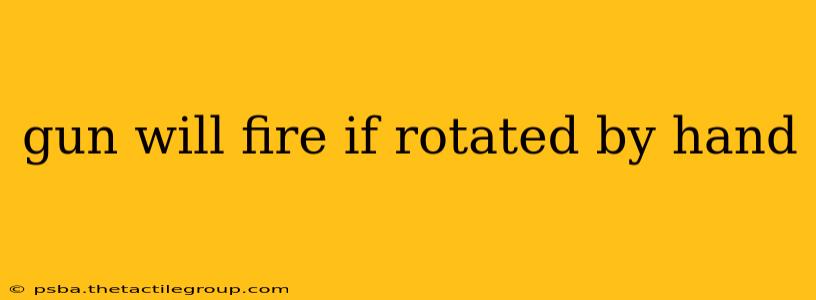Can You Fire a Gun by Rotating the Cylinder by Hand? A Comprehensive Look at Firearms Safety
The question of whether you can fire a gun simply by rotating its cylinder by hand is a crucial one, touching on fundamental firearm safety. The short answer is: generally no, but it's extremely dangerous to assume this is always true. The possibility hinges on several factors, and attempting this action is incredibly risky and should never be undertaken.
This article will delve into the mechanics of different firearm types, explore the potential scenarios where manual rotation could lead to discharge, and ultimately reinforce the paramount importance of safe firearm handling.
Understanding Firearm Mechanisms
Most handguns, particularly revolvers, utilize a system where the hammer must be cocked (moved to its rearmost position) before the trigger can release it, causing the firing pin to strike the cartridge primer. This cocking action is typically achieved manually or via the hammer's interaction with the firearm's mechanism during cycling.
Revolvers: In a revolver, the cylinder rotates to bring each chamber into alignment with the barrel. While manually rotating the cylinder might seem harmless, this doesn't guarantee the hammer isn't already cocked. If it is, even a slight rotational movement could cause the hammer to slip and discharge the weapon. The force of rotation itself is unlikely to directly fire the weapon, but it can easily trigger an already-cocked hammer.
Semi-automatic Pistols: Semi-automatic pistols operate differently, with their firing mechanism relying on the interaction of the slide, firing pin, and trigger. Manual manipulation of the slide or other parts is even more dangerous than with a revolver because the risks of an accidental discharge are higher due to the complexities of their internal mechanisms. There's virtually no scenario where simply handling the slide would cause a discharge, but this is not something that should be tested.
Scenarios Where Accidental Discharge is Possible
While rare, certain situations increase the risk of accidental discharge through manual cylinder rotation:
- Pre-cocked Hammer: If the hammer is already cocked, even a minor movement of the cylinder can be enough to cause a discharge. This is particularly true with older or poorly maintained firearms.
- Damaged Components: Worn or damaged internal parts might create unintended interactions. This could lead to the hammer dropping or a firing pin striking a primer accidentally, even from a seemingly innocuous action.
- Improperly Loaded Ammunition: A cartridge could be deformed in a way that causes it to fire upon being moved in the cylinder.
- Improper Storage: If a firearm isn't stored properly, it might be in an unsafe condition (cocked hammer, cartridge in the chamber, etc.), significantly increasing the risk of accidental discharge.
The Importance of Safe Gun Handling
The possibility of accidentally firing a gun by rotating the cylinder by hand, while low, highlights the crucial need for responsible firearm ownership and handling. Never assume a gun is unloaded. Always treat every firearm as if it were loaded.
Key Safety Practices:
- Properly Unload the Firearm: Before handling any firearm, ensure it's completely unloaded and the chamber is visually inspected.
- Check the Chamber: Visually inspect the chamber to confirm it is empty.
- Never Point a Gun at Anything You Are Not Willing to Destroy: This cardinal rule of firearm safety is paramount.
- Keep Your Finger Off the Trigger: Keep your finger off the trigger until you are ready to fire.
- Be Aware of Your Surroundings: Pay attention to what is around you before and while handling a firearm.
Ignoring these safety guidelines can lead to serious injury or death. The consequences of mishandling a firearm far outweigh any curiosity about its mechanics.
Disclaimer: This information is for educational purposes only. It should not be considered a substitute for professional training in firearm safety. Always seek instruction from a qualified firearms instructor before handling any firearm.

